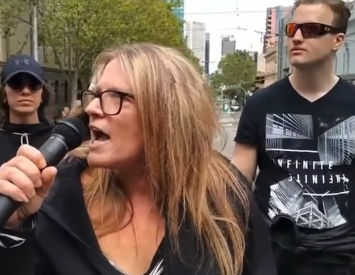In order to maintain power, the right has been building momentum under Scott Morrison to further disorientate voters.
An election victory for the Coalition would mean a country we barely recognise today.
When I say "democracy" I mean the system that we currently have, such that it is of course. For boat arrival refugees, many have not experienced a fair chance since the Tampa affair. For indigenous people, well, they’re still waiting.
The rise of Donald Trump has changed politics forever in the U.S. and has had real consequences here, our "greatest ally", cemented by AUKUS. With the election of Trump in 2024 looking more and more possible, it’s time to evaluate the health and direction of Australia's democracy.
Canadian political scientist Thomas Homer-Dixon recently has warned his countrymen of a slide to fascism by their southern neighbour. He argues that the re-election of Trump would be a time of retribution, with increasing dysfunctional government and immense social breakdown. He postulates that following the Trump shock, a more competent leader with better management skills would come to the fore.
But permanent damage to democracy would occur.
Impossible you say. Perhaps you are convinced that something like that wouldn't happen. Like, Germany for example?
Let’s have a look at the "fascism checklist" and see how things are going.
Based on a list compiled by author Damion Reinhardt in 2015, prior to Trump’s election, this checklist has become somewhat prophetic in retrospect. He suggests there are four main ingredients.
How does it measure up now?
- Nationalism: Tick. No one could accuse Mr Trump of not being an extreme nationalist.
- Palingenesis: This checks out too. It refers to the stated desire to return a country from its wayward path, in Trump’s words, to “Make America Great Again”. The focus of this kind of rhetoric is not on those from outside but on the enemies from within.
- Direct Action: Trump loved to attack the people who did not agree with him, the media included, and particularly at his rallies, where he even goaded the crowd to hate and attack those who dissented. The willingness of his supporters to attack the House on 6 January one year ago is a testament to how well Trump and his acolytes have managed to enflame the rage towards those who choose to stand in his way. They came ready to hang even the Republican Vice-President Mike Pence.
- Totalitarianism: Key to this is the development of an ideology that has economic, political and religious features that support the idea of a dictatorship and an end to democracy. Trump certainly used religious props to win over certain segments of the population, garnering support from the Pentecostal movement and among the most virulent evangelicals. One of his first executive orders was to enshrine "religious liberty". Trump arguably had totalitarian tendencies.
Sitting alongside this was the neo-right philosophy of "small government" which saw Trump attack social services while dismantling corporate regulation. This model of totalitarianism isn’t really about a small powerless government at all, but a state that provides little service to the public, while being enforced up by a strong police and surveillance apparatus. All the evidence suggests that the U.S. is well down this path.
Lastly in terms of propaganda, Trump’s militant hatred of the left, "liberals" and "socialism" was so extreme it made McCarthy look like an amateur. Key to this was the destruction of the idea of an unbiased media, and the rise of the "underdog" narrative, fighting against the powerful forces of the rich.
Following this we saw his attack on the democratic voting system, because of its "failure" to return him to office, now a festering sore on the psyche of his followers. That is thanks, in no small part, to the Trump backers such as Michael Flynn and Steve Bannon.
The influence of the QAnon phenomenon has proved a key element of all aspects in the rise of Trump’s ideology and given his current level of support, it has been quite successful in its implementation.
Let’s turn to Australia. Let’s have a quick look at the fascism check-list for the Morrison Government.
- Nationalism: No one from any side of politics would not go along with the idea that Morrison and the Coalition Government was not nationalist, particularly in the context of China and wanting to "protect our sovereignty", and the supposed existential threat of refugees, which goes all the way back to Howard, virtually unchallenged by either major political party.
- Palingenesis. This is the biggest point of difference with the U.S. While some local actors are pushing the "Make Australia Great Again" line, Australia never was really "great" in the sense of being a major influencer on the world stage. Nevertheless, nationalists like to harken back to a kind of golden age, generally associated with wartime exploits and home unity during war.
- Direct Action: The disruption to the normal patterns of society caused by the pandemic and the often clumsy responses by governments in dealing with the crisis have fuelled a rise in popular discontent in some quarters. This has been used to good measure by a growing and more organised anti-government movement bringing together anti-vaxxers, sovereign citizens and others. Key players in this are known far right actors and again the United Australia Party. Of note were the anti-Daniel Andrews demonstrations in Victoria mimicking some of the symbols of the U.S. 6 Jan insurgency, such as gallows and threats of violence.
- Totalitarianism: Perhaps the most damage to our democracy has been achieved under the Morrison Government through the development and implementation of a far-right ideology that includes the many of the ingredients seen in the U.S. Key trends include the growth of religious tone by politicians, particularly the PM himself and others. Even Craig Kelly and Matt Canavan have developed a "born again" religious approach, a definite strategy to bring religious-identifying groups into the fold. The Coalition's "Religious Freedom Bill" has overtones with Trump’s executive order. Though, it likely falls short of satisfying this criteria.
The goal of achieving "small government" such as advocated by the corporate far right in the U.S. is well underway in Australia and has been underway since Howard. This has been achieved by the growth of well-used strategies to undermine regulatory safeguards to development and corruption; outsourcing the public service and community services to corporate entities; the maintenance of tax-free and high subsidy regimes for big corporates; and the oblique political donations system.
What is most noticeable is the erosion of the idea of the public good.
Outcomes have been increasingly weighed not against the public benefit but in terms of the outcomes for political parties, their corporate allies and the maintenance of power. Why else would the sexual crimes of political figures be covered up; politicians becoming increasingly rich while not delivering for constituents; and the attack on science from politicians.
But no better example of this trend than the establishment of corporate goals for government departments, for no longer are they accountable to the public, but to their "clients".
Currently we are in a jittery pre-election phase, with the Morrison Government down in the polls. It reminds me of the 2019 election when no-one predicted a Coalition victory, but then Palmer’s United Australia Party played a crucial role in directing preferences and attacking Labor.
Expect more of the same this time. The UAP has been playing a critical role in the election build up, maintaining a high profile, using data mining with targeted and blanket advertising. Craig Kelly may not be your cup of tea, but his anti-government messages are gaining traction among the disaffected, though whether he can hold his seat of Hughes is another question.
But don’t be fooled with the UAP’s sporadic attacks on the Morrison Government. They have done their homework and their preferences will flow to the Coalition, as will Pauline Hanson’s of One Nation. Somehow even after nine years of Coalition Government, UAP and fringe groups such as Advance Australia maintain it is Labor who are the enemy of the working class.
The 2022 election will see democracy under increasing threat in our country. Now is time for vigilance.
David Paull is an Australian ecologist and blogger on politics and the environment. You can follow David on Twitter @davesgas.
Related Articles
- Inflation worse under Coalition than Labor, contrary to Morrison's claims
- CARTOONS: Defamations R Us
- House prices skyrocket and social housing collapses under the Coalition
- The Liberals must call Nationals' bluff on climate
- CARTOONS: Mark David is checking the climate
 This work is licensed under a Creative Commons Attribution-NonCommercial-NoDerivs 3.0 Australia License
This work is licensed under a Creative Commons Attribution-NonCommercial-NoDerivs 3.0 Australia License
Support independent journalism Subscribe to IA.















